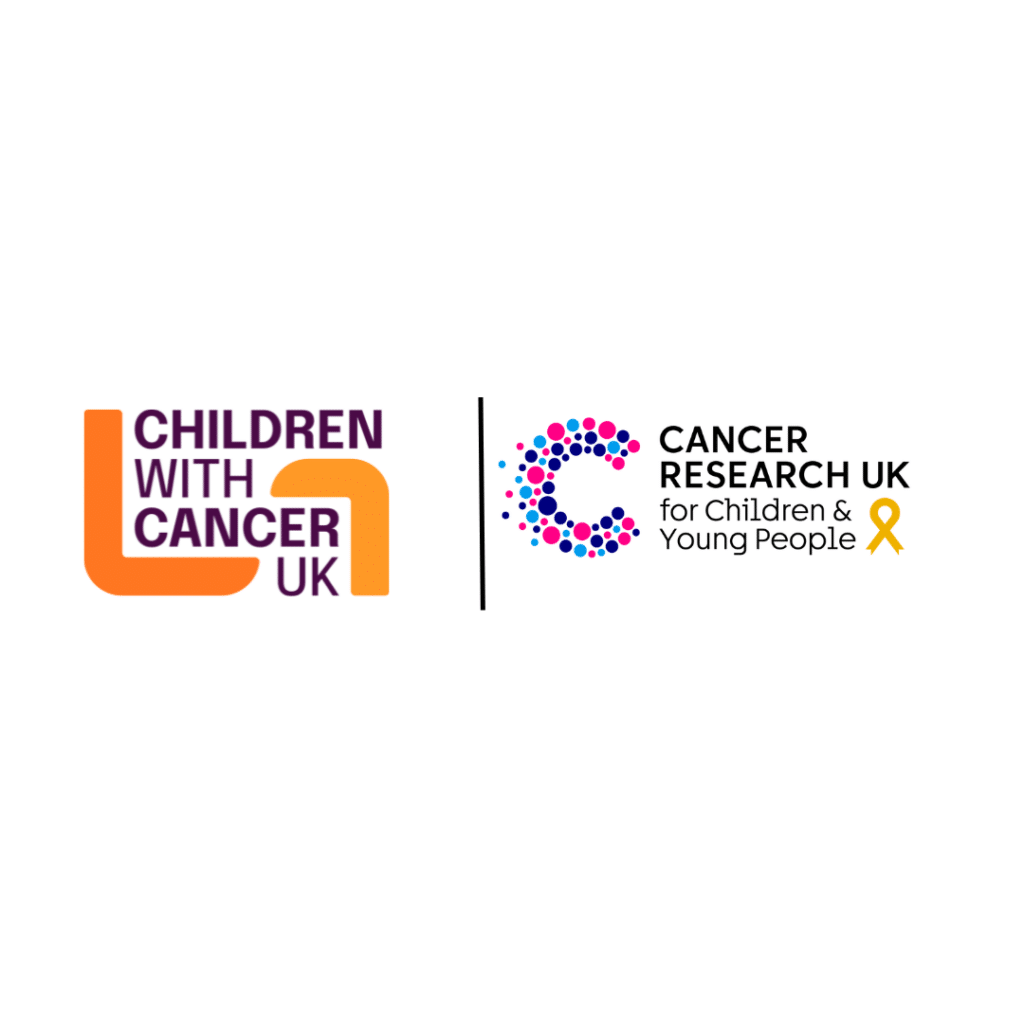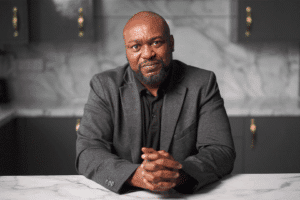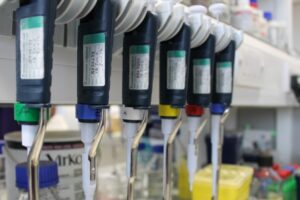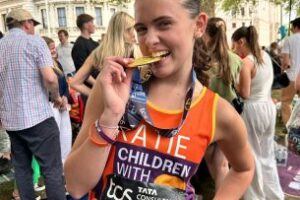Children with Cancer UK and Cancer Research UK co-fund pioneering £5.5 million research programme
The SMPaeds2 project will be led by Professor Louis Chesler at The Institute of Cancer Research, London. The first phase of the programme, completed in October 2023, led to the implementation of new molecular diagnostic tests for childhood cancer on the NHS.
20 November 2023

Leading charities Children with Cancer UK and Cancer Research UK will co-fund a major £5.5 million research programme to advance precision medicine for children and young people whose cancer has returned.
The Stratified Medicine Paediatrics 2 (SMPaeds2) research programme will be led by Professor Louis Chesler at The Institute of Cancer Research, London, alongside his co-leads, Professor Darren Hargrave at Great Ormond Street Hospital for Children NHS Foundation Trust (GOSH) and Dr Isidro Cortes Ciriano at the European Molecular Biology Laboratory’s European Bioinformatics Institute (EMBL-EBI).
SMPaeds2 will investigate blood cancers and solid tumours in children and young people, including in the brain, muscle and bone, which can be more difficult to access, diagnose and treat.
Precision medicine is an approach which involves delivering treatments tailored to the individual patient. In cancer, this considers the specific changes in an individual patient’s tumour, allowing for more effective treatment whilst reducing long-term side effects. However, there remain barriers to the development and availability of precision cancer medicines for children and young people. This is in part due to childhood tumours having fewer genetic changes compared to adult tumours.
SMPaeds2 aims to develop and study new tests that will build upon the success of the first phase of the programme, Stratified Medicine Paediatrics (SMPaeds1), which established the UK’s first National Molecular Tumour profiling platform for relapsed childhood cancer. Molecular tumour profiling maps the unique changes in the DNA of a person’s tumour, giving doctors information to help match the patient to the best treatment or clinical trial for their individual cancer.
The advanced genetic tests and analyses that SMPaeds2 will develop will provide scientists with unprecedented insights into the biology of relapsed childhood cancers, aiding precision medicine today and unlocking the potential to develop new and better precision therapies in the future. There is limited advanced testing of children’s tissue biopsy and blood for relapsed cancers.
Diagnostic cancer tests developed by SMPaeds1 were implemented by NHS England for Standard of Care clinical use in 2020, representing a major success for young cancer patients. However, there is a continued need to diagnose children and young people with greater speed and precision.
SMPaeds2 will work alongside the NHS to develop ‘liquid-based’ cancer tests that require little or no tissue, and instead work in blood and other body fluids, offering more information in less time. The hope is to be able to reduce or eliminate the need for invasive biopsies entirely.
Within five years, it is hoped that new tests developed by SMPaeds2 will help doctors to detect or even predict childhood cancer relapse earlier, as well as lead to the development of new precision medicines. It could also allow them to monitor how a patient is responding to treatment in-real time, meaning they could change or adapt the individual treatment approach if a treatment isn’t working.
Survival rates for children’s cancers are improving. Fifty years ago, 6 in 10 children diagnosed with cancer died[i]; today more than 8 in 10 children diagnosed with cancer in the UK survive[ii]. However, cancer is still a leading causes of death for children aged 0-14 in the UK[iii].
[i] National Cancer Intelligence Network. National Registry of Childhood Tumours Progress Report, 2012.
[ii] National Cancer Registration and Analysis Service. Children, teenagers and young adults UK cancer statistics report 2021.
[iii] Web content: Cancer Research UK, https://www.cancerresearchuk.org/health-professional/cancer-statistics/childrens-cancers/mortality, Accessed November 2023
Jo Elvin, CEO at Children with Cancer, said:
We are delighted to continue funding this pioneering research project into its second phase, which could mark a real step-change in the way childhood cancer relapse is diagnosed, monitored and treated. SMPaeds2 will identify specific patterns of childhood cancer relapse, highlight resistance to treatment and provide an infrastructure by which all children seeking experimental therapy on future clinical trials can be rapidly diagnosed and monitored.
The data generated by SMPaeds2 will support the development of next-generation clinical trials, to help deliver more effective, targeted treatment. Our ambition is that all children diagnosed with cancer in the UK have access to precision medicine and this pioneering research will play a crucial role in making that a reality for young cancer patients.
Michelle Mitchell OBE, CEO at Cancer Research UK, said:
Cancer in children and young people is different to cancer in adults and presents a unique set of challenges that we must overcome. We’re taking on these challenges through transformational initiatives like the Stratified Medicine Paediatrics programmes. This programme aims to maximise new technological advancements to profile young patients’ cancers less invasively, more quickly and in more detail than ever before. This will allow patients to continue to be matched to the best possible treatment for their individual cancer, unlock the ability to study these cancers in unprecedented detail and help develop new and better treatments for children and young people that cause fewer long-term side effects. We are delighted to co-fund these pioneering programmes with our partners, Children with Cancer UK. By working together, we are determined to overcome the challenges and ultimately help more children and young people survive cancer with a better quality of life.
Professor Louis Chesler, Professor of Paediatric Cancer Biology at The Institute of Cancer Research, London, and Consultant in Paediatric Oncology at The Royal Marsden NHS Foundation Trust, said:
Through this programme, which brings together some of the UK’s leading experts, we are pushing the frontiers of treatment for childhood cancers – bringing us closer to a reality where every child with cancer receives treatment that is tailored to the unique biology of their cancer, and where it’s possible to identify these treatments through a simple blood test, rather than an invasive biopsy. Beyond the more immediate impact, this collaborative programme could also unveil crucial insights into the biology of childhood cancers and highlight areas for future scientific discovery, to help drive the development of new and more effective treatments. We’re immensely grateful to Children with Cancer UK and Cancer Research UK, and their supporters, for making this ambitious research programme possible. This programme would also not be possible without the support of the 20 treatment centres, their patients and their families. Together, we hope this programme will secure a brighter future for children with cancer.
SMPaeds2 is a collaboration between The Institute of Cancer Research (ICR), Great Ormond Street Hospital for Children NHS Foundation Trust (GOSH), the European Molecular Biology Laboratory’s European Bioinformatics Institute (EMBL-EBI), University College London (UCL), the University of Birmingham, Birmingham Cancer Research UK Clinical Trials Unit (University of Birmingham), Cancer Grand Challenges Rosetta team, The National Physical Laboratory, The Francis Crick Institute, Genomics England, Genomics Medicine Services Alliance (North London Genomics Hub), the University of Nottingham, the University of Newcastle, the Experimental Cancer Medicine Centres and the dedicated Stratified Medicine Paediatrics parent and patient representatives.
Further information about the SMPaeds2 project:
SMPaeds2 will advance the capability of current genomic testing, by:
- Identifying with greater precision the specific molecular changes and potential drug targets found in childhood cancer relapse
- Identifying interactions between the tumour, immune system and tissue that enhance the response to emerging new treatments and therapies
- Delivering blood-based cancer tests to replace invasive tumour biopsy, that will precisely diagnose cancer, be used to guide treatment and allow regular routine testing to rapidly identify tumour evolution and treatment resistance
The study will retain the same expert team and infrastructure developed in SMPaeds1, but will incorporate new, cutting-edge techniques with greater power to detect molecular changes in tumour tissues and blood. The project will deliver tissue and blood from 20 paediatric treatment hospitals to a dedicated NHS research hub in London.
The SMPaeds2 project will compile the largest yet assembled bank of childhood cancer biopsies, blood and cerebral spinal fluid, to produce a comprehensive view of relapsed tumours and circulating tumour DNA, which can then be compared to and studied against newly diagnosed tumours.
A panel of oncology experts, the national Molecular Tumour Board, will discuss the findings of the genetic analysis to make informed recommendations for patient treatment, including assigning patients to clinical trials for new targeted drugs and therapies. The project has involved discussions with cancer patients and their families who wish to participate in research to increase the accuracy of cancer tests and reduce the need for invasive biopsies.
About Cancer Research UK for Children & Young People:
- Cancer Research UK is the world’s leading cancer charity dedicated to saving lives through research, influence and information.
- Cancer Research UK is the largest charitable funder of research into cancers that affect children and young people in the UK.
- Cancer Research UK for Children & Young People is the part of Cancer Research UK dedicated to supporting research into cancers affecting 0-24-year-olds.
- Around 32,600 cancer deaths in children and young people have been avoided since the 1970s in the UK, thanks in part to the work of Cancer Research UK.*
- Together with its partners and supporters, Cancer Research UK for Children & Young People is working towards a world where children and young people can live longer, better lives, free from the fear of cancer.
- Money raised through Cancer Research UK for Children & Young People will be used to fund research into cancers affecting children and young people (aged 0-24).
- For more information, please visit www.cruk.org/childrenandyoungpeople or follow us on Facebook at www.facebook.com/CRUKYoungPeople/.
* Calculated by the Cancer Intelligence team at Cancer Research UK, August 2023. Deaths avoided for all cancers combined (ICD-10 C00-C97, D32-D33, D35.2-D35.4, D42-D43, D44.3-D44.5) were estimated separately for males and females aged 0-14 and 15-24 by comparing the observed annual number of cancer deaths in each 3-year rolling average period (1971-73 to 2018+19+21 inclusive) against the number of cancer deaths that would have occurred, had mortality rates remained at their 1971-1973 annual average levels. Deaths avoided for persons was estimated as the sum of deaths avoided for male and females.
About The Institute of Cancer Research, London:
The Institute of Cancer Research, London, is one of the world’s most influential cancer research organisations.
Scientists and clinicians at The Institute of Cancer Research (ICR) are working every day to make a real impact on cancer patients’ lives. Through its unique partnership with The Royal Marsden NHS Foundation Trust and ‘bench-to-bedside’ approach, the ICR is able to create and deliver results in a way that other institutions cannot. Together the two organisations are rated in the top four centres for cancer research and treatment globally.
The ICR has an outstanding record of achievement dating back more than 100 years. It provided the first convincing evidence that DNA damage is the basic cause of cancer, laying the foundation for the now universally accepted idea that cancer is a genetic disease. Today it is a world leader at identifying cancer-related genes and discovering new targeted drugs for personalised cancer treatment.
The ICR is a charity and relies on support from partner organisations, funders and the general public. A member institution of the University of London, it is one of the UK’s leading higher education institutions, placing first for biological sciences and second overall in the definitive ‘REF2021’ rankings of UK university research quality, impact and environment, and provides postgraduate higher education of international distinction.
The ICR’s mission is to make the discoveries that defeat cancer.
For more information visit ICR.ac.uk
Other stories
We have lots of information to help you learn more about childhood cancer. From specific cancer types, to treatments and causes.









